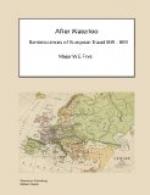The women of the Canton de Vaud are in general very handsome, well shaped and graceful; litterature, music, dancing and drawing are cultivated by them with success; and among the men, tho’ one does not meet perhaps with quite as much instruction as at Geneva (I mean that it is not so general), yet no pedantry whatever prevails as in Geneva. At Lausanne they have sincere and solid republican principles and they do not pay that servile court to the English that the Genevese do; nor have they as yet adopted the phrase “Dieu me damne.”
PARIS, Dec. 5th.
I returned to Paris by Geneva and crossing the Jura chain of mountains passed thro’ Dole, Auxonne and Dijon. At Geneva, where I stopped three days, I met, at a musical party given by M. Picot the banker, the celebrated cantatrice Grassini, who looked as beautiful as ever, and sung in the most fascinating style several airs, particularly “Quelle pupille tenere” in the opera of the Orazj e Curiazi. To my taste her style of singing is far preferable to that of Catalani; there is much more pathos and feeling in the singing of Grassini; it is completely and truly the “cantar che nell’anima si sente.” Catalani is very powerful, wonderful, if you will, in execution; but she does not touch my heart as Grassini does.
On my return to Paris from Geneva I found that the conditions of peace had been made public. They are certainly hard, not so much on account of the cession of territory, which is trifling, as on account of the vast sums of money that Prance is obliged to pay, and the still more galling condition of having to pay and feed at her expense an army of occupation of 150,000 men, of the Allied troops, for a term of three or five years, and to cede during that period several important fortresses. The inhabitants of Paris look very gloomy and nobody seems to think that the peace will last half as long. Prussia and Austria strove hard to wrest Alsace and German Lorraine from France; hosts of German publicists had accompanied their armies into France and had written pamphlet upon pamphlet to prove that mountains and not rivers were the proper boundaries of nations and that wherever the German language prevails, the country ought to belong to the Germanic body. Ergo, the Vosges mountains were the natural boundaries of France, and Alsace and German Lorraine should revert to Germany. Russia and England, however, opposed this, and insisted that these two provinces should remain with France; but I have no doubt that the first movements that may occur in France (and they will perhaps be secretly encouraged) will serve as a pretext for the Allies to separate these countries definitively from France.




